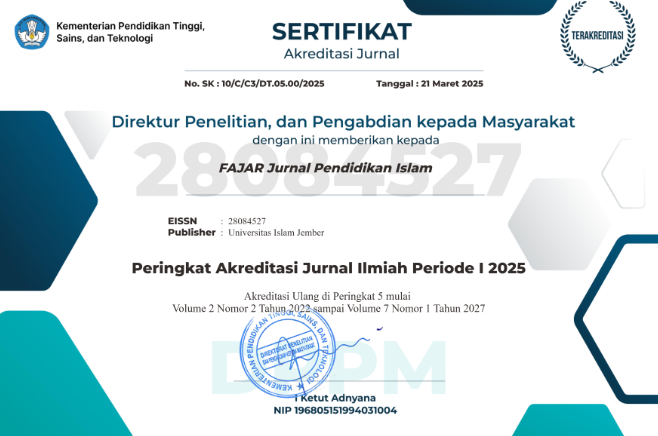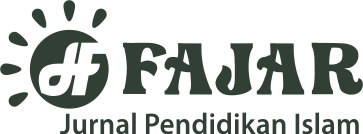ISLAMIC EDUCATION IN TWO THOUGHT POLES: AN ANALYSIS OF THE IDEAS OF KH. HASYIM ASY’ARI AND KH. AHMAD DAHLAN
DOI:
https://doi.org/10.56013/fj.v5i2.4533Keywords:
Integration of Knowledge; Islamic Education, Muhammadiyah; Nahdlatul UlamaAbstract
The purpose of this study is to compare the concepts of Islamic education from the perspectives of KH. Hasyim Asy'ari and KH. Ahmad Dahlan. This study uses a qualitative method with a literature review. The collected data are analyzed descriptively. This study concludes that KH. Hasyim Asy'ari is known for his pesantren education model, which emphasizes the deepening of religious knowledge and character building, while KH. Ahmad Dahlan pioneered the integration of religious and general knowledge through the modern madrasah system. Pesantren and madrasah are two main educational models that complement each other in shaping a generation of Muslims who are knowledgeable, have good character, and are ready to face the challenges of the times. The integration of religious and general knowledge is the key to creating holistic Islamic education that is relevant to the needs of modern society. NU plays a role in preserving classical Islamic scholarly traditions through pesantren and madrasah diniyah, while Muhammadiyah develops modern education that adapts to the times without neglecting Islamic values. The educational concepts and practices proposed by these two figures have become important pillars in national development, making Islamic education in Indonesia adaptive, inclusive, and rooted in Islamic values. The contributions of NU and Muhammadiyah to contemporary Islamic education are highly significant in addressing the challenges of the times. By combining the strength of traditional scholarship with modern innovation, both organizations have created a holistic, adaptive model of Islamic education that is oriented toward Islamic values and 21st-century competencies. Their synergy must continue to be strengthened to shape a moderate, competitive Muslim generation ready to face the era of globalization.
References
Adlini, Miza Nina, Anisya Hanifa Dinda, Sarah Yulinda, Octavia Chotimah, and Sauda Julia Merliyana. “Metode Penelitian Kualitatif Studi Pustaka.” Jurnal Edumaspul 6, no. 1 (2022): 974–80.
Alfani, Ilzam Hubby Dzikrillah, and Putri Wanda Mawaddah. “Nilai-Nilai Syiar Islam Dan Budaya Pada Tradisi Takbir Keliling Pondok Pesantren Krapyak Yayasan Ali Maksum Yogyakarta.” AT-THARIQ: Jurnal Studi Islam Dan Budaya 4, no. 01 (February 29, 2024). https://doi.org/10.57210/trq.v4i01.278.
Alfani, Ilzam Hubby Dzikrillah, Mukhsin Mukhsin, Muhammad Hafidz Khusnadin, Khoirul Umam Addzaky, and Putri Wanda Mawaddah. “Child Education in the Qur’anic Perspective: Tafsir Tarbawi Analysis and Its Implications for Modern Education.” Jurnal Penelitian Ilmu-Ilmu Sosial 6, no. 1 (2025): 12–34.
Amelia, Tasya Faricha, and Hudaidah Hudaidah. “Pembaharuan Pendidikan Berdasarkan Pemikiran KH Ahmad Dahlan.” Edukatif: Jurnal Ilmu Pendidikan 3, no. 2 (2021): 472–79.
Aristiyanto, Roma. “Sejarah Pertumbuhan Dan Perkembangan Madrasah Di Indonesia Pada Era Modern.” Jurnal Ilmu Manajemen Dan Pendidikan 3, no. 2 (2023): 101–8.
Asyari, Akhmad, and Jumarim Jumarim. “Kependidikan NU Dan Pendidikan Ke-NU-an: Studi Kasus Tatakelola Lembaga Pendidikan Al-Ma’arif Nahdlatul Ulama Nusa Tenggara Barat.” EL-HIKMAH: Jurnal Kajian Dan Penelitian Pendidikan Islam 15, no. 2 (2021): 107–32.
Azizah, Nurul. “Pemikiran KH Hasyim Asy’ari Tentang Konsep Pendidikan.” Ta Lim Jurnal Pendidikan Agama Islam Dan Manajemen Pendidikan Islam 2, no. 1 (2023): 25–32.
Darwis, Muhammad, Zuhdiah Zuhdiah, and Bahaking Rama. “Pemikiran Pendidikan Islam KH Ahmad Dahlan Dan KH Hasyim Asy’ari.” JUPEIS: Jurnal Pendidikan Dan Ilmu Sosial 3, no. 1 (2024): 60–66.
Daulay, Saripuddin, and Rasyid Anwar Dalimunthe. “Modernisasi Pendidikan Islam Di Indonesia (Komparasi Pengalaman Organisasi Muhammadiyah Dan Nahdlatul Ulama).” Fitrah: Journal of Islamic Education 2, no. 2 (2021): 125–40.
Faizi, Nur. “Pemikiran Ahmad Dahlan Tentang Pendidikan Dan Relevansinya Dengan Pendidikan Kontemporer.” EL-HIKMAH: Jurnal Kajian Dan Penelitian Pendidikan Islam 16, no. 1 (2022): 1–12.
Hadi, Abdul, Aries Abbas, Padjrin Padjrin, and Munir Munir. “Pemikiran Pendidikan Pesantren K.h. Hasyim Asy’ari Dan Pengembangan Pendidikan Islam Di Indonesia.” Tadrib 7, no. 1 (2021): 91–108. https://doi.org/10.19109/tadrib.v7i1.8719.
Hak, Nurul, Abdul Mustaqim, Ahmad Baidhowi, and Saefuddin Zuhri. “Genealogi Dan Jaringan Keilmuan Pesantren Modern: Di Banten, Jawa Tengah, Dan Jawa Timur.” Semesta Aksara, 2023.
Hasbullah, Hasbullah. “Konsep Pendidikan Karakter Nahdlatul Ulama (NU).” Jurnal Kajian Pendidikan Islam, 2022, 43–57.
Herlina, Lenny. “Pendidikan Islam Berkemajuan Muhammadiyah: Peletak Dasar Dan Implementasinya Hingga Akhir Abad XX.” Widya Balina 7, no. 1 (2022): 413–24.
Ismail, Ismail. “Konsep Pendidikan KH. Ahmad Dahlan.” Al-Qalam: Jurnal Kajian Islam Dan Pendidikan 6, no. 1 (2014): 65–73.
Ismayani, Ismayani, Andi Warisno, Afif Anshori, and Andari Andari. “Pesantren Dan Pembaruan: Arah Dan Implikasi.” Research and Development Journal of Education 9, no. 1 (2023): 161–70.
Mainuddin, Mainuddin, and Lilis Dini Septiani. “Konsep Pendidikan Islam Dalam Perspektif KH. Ahmad Dahlan.” TAJDID: Jurnal Pemikiran Keislaman Dan Kemanusiaan 6, no. 1 (2022): 1–13.
Maulidia, Adelia, and Nana Sutarna. “Peran Muhammadiyah Dan Nahdlatul Ulama Dalam Dunia Pendidikan (Telaah Pada Jenjang Pendidikan Dasar).” Jurnal Lensa Pendas 5, no. 1 (2020): 42–50.
Mukhsin, Mukhsin, Ilzam Hubby Dzikrillah Alfani, and Ridwan Fauzi. “The Role of Nahdlatul Ulama and Muhammadiyah Youth in Promoting Islamic Moderation in Indonesia.” An-Nida’ 48, no. 2 (December 30, 2024): 183–205. https://doi.org/10.24014/an-nida.v48i2.32457.
Ningtias, Ratih Kusuma. “Modernisasi Sistem Pembelajaran Pendidikan Agama Islam Di Lembaga Pendidikan Islam Muhammadiyah Dan Nahdlatul Ulama: Studi Di Pondok Pesantren Karangasem Muhammadiyah Dan Pondok Pesantren Sunan Drajat Kecamatan Paciran Kabupaten Lamongan.” Universitas Islam Negeri Maulana Malik Ibrahim, 2015.
Pranata, Fringgi, Sukarno Sukarno, and Kasful Anwar. “Konsep Etika Antara Guru Dan Murid Dalam Upaya Meningkatkan Etis Religius Manajemen Pendidikan Islam Telaah Atas Pemikiran Al-Zarnuji
Dan KH. Hasyim Asy’ari.” Al-Madrasah: Jurnal Ilmiah Pendidikan Madrasah Ibtidaiyah 7, no. 3 (2023): 1259–75.
Ramadhan, Muhammad. “Pendidikan Islam KH. Hasyim Asy’ari,” 2021.
Sari, Desi Ratna, Novita Sari, Dwi Noviani, and Paizaluddin Paizaluddin. “Pemikiran Pendidikan Islam Ahmad Dahlan.” Ihsanika: Jurnal Pendidikan Agama Islam 1, no. 3 (2023): 134–47.
Sarianti, Opet, and Muhammad Zalnur Zulmuqim. “Peran Muhammadiyah, Nahdatul Ulama Dan PERTI Dalam Perkembangan Lembaga Pendidikan Islam.” AL-IBANAH, 2024.
Sholihuddin, Ahmad. “Membangun Karakter Bangsa Dari Pesantren: Studi Pemikiran Hasyim Asy’ari Tentang Pendidikan Karakter.” Al-Riwayah: Jurnal Kependidikan 7, no. 1 (2015): 61–82.
Sugiati, Sugiati. “KH Ahmad Dahlan Tinjauan Terhadap Konsep Pendidikannya.” CENDEKIA: Jurnal Ilmu Pengetahuan 2, no. 3 (2022): 169–77.
Suyatno, S. “Relevansi Pendidikan Muhammadiyah Dalam Menghadapi Era Smart Society 5.0.” Jurnal Basicedu 8, no. 2 (2024): 1190–99.
Yuniari, Shindy. “Pemikiran Pendidikan Islam Menurut Kh. Hasyim Asy’ari.” Kutubkhanah 20, no. 1 (2020): 53–64.
Downloads
Published
How to Cite
Issue
Section
License
Copyright (c) 2025 FAJAR Jurnal Pendidikan Islam

This work is licensed under a Creative Commons Attribution-ShareAlike 4.0 International License.



